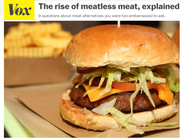
Australia has a relationship with meat that runs deep - be it the backyard barbie, a sausage sizzle or a slab of steak. That’s why I was surprised, on my latest visit, to see a slew of “meatless meat” brands in the meat section of the local supermarket.
A quick read on the internet suggested that a revolution could well be under way; over 12% of Aussies have primarily vegetarian diets, local set ups like the Alternative Meat Co. and Soul Fresh are registering strong growth in supermarkets and even the founder of Hungry Jacks -Burger King in Australia- has gotten onto the gravy train, betting big on plant-based meats.
Of course, ‘meatless meat’ is the big story globally in 2019, with Beyond Meat valued at a bordering-on-ludicrous $8billion. These products are designed to target meat eaters rather than vegans and vegetarians and such valuations are based on a large-scale shift to plant-based or cell-based meat - ‘grown not bred’.
A quick read on the internet suggested that a revolution could well be under way; over 12% of Aussies have primarily vegetarian diets, local set ups like the Alternative Meat Co. and Soul Fresh are registering strong growth in supermarkets and even the founder of Hungry Jacks -Burger King in Australia- has gotten onto the gravy train, betting big on plant-based meats.
Of course, ‘meatless meat’ is the big story globally in 2019, with Beyond Meat valued at a bordering-on-ludicrous $8billion. These products are designed to target meat eaters rather than vegans and vegetarians and such valuations are based on a large-scale shift to plant-based or cell-based meat - ‘grown not bred’.

From a marketing standpoint, the question that comes to mind is what the trigger to get die-hard meat eaters to shift could be. Would it be the ethics of what animals are put through in farm factories? Or is there a health story around no antibiotics, no growth hormones; other than the much-touted link of red meat to heart disease and cancer? Or the bigger issue of climate change and the fact that livestock cultivation is one of the most greenhouse-gas intensive activities out there?
Maybe it’s about ‘nudging’ meat eaters – with innovative supermarket layouts and giving it more indulgent names. For instance, Soul Fresh has an “meaty” range with products like “sticky chicken teriyaki”.
Whatever the approach, it certainly looks like meatless meat is not a flash in the pan. But its biggest challenge may well be one of marketing.
Maybe it’s about ‘nudging’ meat eaters – with innovative supermarket layouts and giving it more indulgent names. For instance, Soul Fresh has an “meaty” range with products like “sticky chicken teriyaki”.
Whatever the approach, it certainly looks like meatless meat is not a flash in the pan. But its biggest challenge may well be one of marketing.

